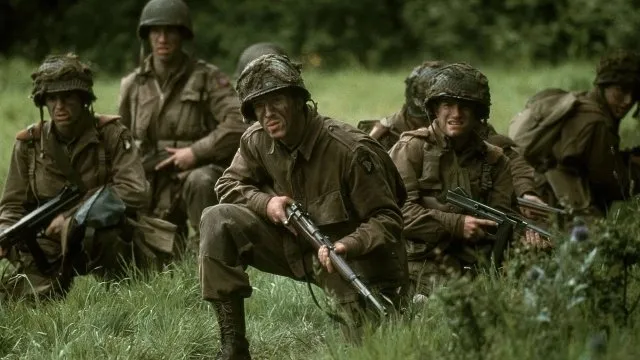
Day of Days (S01E02)
Airdate: September 9th 2001
Written by: John Orloff
Directed by: Richard Loncraine
Running Time: 49 minutes
One of the more enduring and profoundly frustrating realities of modern warfare is that no matter how meticulously a plan is crafted, rehearsed, and refined, chaos invariably intervenes. This central truth lies at the heart of Day of Days, the second episode of the acclaimed HBO miniseries Band of Brothers. For the men of E Company, 506th Parachute Infantry Regiment of the 101st Airborne Division, the night of 6 June 1944—the eve of D-Day—marks not only their baptism of fire but a brutal lesson in the unpredictability of combat. As C-47 transport planes cross the English Channel en route to their designated drop zones behind German coastal defences in Normandy, the scale of the airborne operation becomes a liability. The sheer number of aircraft makes stealth impossible, and German flak batteries respond with devastating efficiency, shooting down or damaging numerous planes. Paratroopers are scattered across the Normandy countryside, many killed or wounded before they even touch the ground. Lieutenant Dick Winters, portrayed by Damian Lewis, lands far from his objective, stripped of most of his equipment and forced to rally a disorganised mix of soldiers from various units. By dawn, the grim reality sets in: the company’s original commander, Lieutenant Thomas Meehan, is missing—presumed dead—leaving Winters, as the senior officer present, to assume command. Tasked by Colonel Sink with destroying a German artillery battery threatening the American landings at Utah Beach, Winters leads a surprise assault on the position near Brécourt Manor. Despite being heavily outnumbered, the attack is a textbook example of small-unit tactics—swift, disciplined, and decisive. The mission succeeds with minimal casualties, and the paratroopers eventually link up with the advancing 4th Infantry Division. As night falls and the horizon glows with the fires of war, Winters reflects on the day’s horrors, quietly vowing that if he survives this "day of days" and the one to follow, he will dedicate his life to peace—a poignant moment of humanity amid the carnage.
In contrast to the first episode, Currahee, which focused on character development, training, and the forging of brotherhood, Day of Days is markedly more concise and action-driven. Runtime is shorter and the narrative thrust is concentrated almost entirely on the events of D-Day, offering little in the way of exposition or backstory. This shift in tone underscores the sudden transition from preparation to execution—a transition the soldiers themselves experience with little warning. The episode immerses the viewer directly into the chaos of war, mirroring the disorientation felt by the paratroopers.
Thematically and stylistically, Day of Days invites inevitable comparisons to Saving Private Ryan, particularly its harrowing opening sequence on Omaha Beach. Both works depict the same historical moment and share a commitment to visceral realism. The airborne assault scenes in Day of Days—with their cacophony of anti-aircraft fire, exploding planes, and desperate jumps into darkness—capture the terror and confusion of combat with impressive scope. However, by today’s standards, the CGI effects, though groundbreaking in 2001, appear somewhat dated and less polished than modern war dramas. Yet, their rawness contributes to the episode’s authenticity, avoiding the over-sheen that can sometimes detract from emotional impact.
Unlike Saving Private Ryan, which lingers on the visceral horror of the beach landing, Day of Days treats the actual drop with restraint. The sequence is fragmented, disorienting, and told almost entirely from Winters’ limited perspective—deliberately understated to reflect his own confusion and survival instinct. This approach effectively conveys the chaotic nature of airborne operations, where success often hinged not on heroism but on the enemy’s equal disarray. The use of recognition signals—passwords and clickers—echoes similar moments in The Longest Day, paying homage to earlier cinematic portrayals of D-Day while grounding the narrative in historical detail.
The assault on Brécourt Manor, occupying roughly a third of the episode, is a masterclass in tactical realism. Filmed without a musical score, the sequence forces the audience to focus on the sounds of war: gunfire, shouted commands, and the grim thud of bodies hitting the ground. The lack of music amplifies the tension and horror, making the violence feel immediate and unvarnished. The paratroopers’ precision under fire demonstrates the value of their rigorous training, turning a desperate situation into a textbook military success. Only later, in quiet moments, do Winters and his men begin to grasp the significance of what they’ve accomplished—a fact underscored in the closing titles, which reveal the battle’s legacy: studied at West Point and instrumental in reducing Allied casualties on Utah Beach.
Amid the chaos, the episode finds space for subtle character moments. Sergeant William Guarnere (Frank John Hughes), haunted by news of his brother’s death in Italy, fires prematurely during a skirmish, an act of emotional release rather than tactical error. His defiance when reprimanded by Winters reveals the psychological toll already beginning to take hold. Similarly, Sergeant Malarkey’s (Scott Grimes) encounter with a German prisoner who grew up in Oregon offers a brief, darkly ironic moment of human connection—only to be shattered by the sound of automatic fire, implying the execution of the prisoners by Lieutenant Ronald Speirs (Matthew Settle). This moment underscores the moral ambiguities of war, where compassion and brutality exist side by side.
Perhaps the most haunting aspect of Day of Days, in retrospect, is its original broadcast context. Aired back-to-back with Currahee on 9 September 2001, the episode’s depiction of American soldiers facing sudden, large-scale violence took on a chilling resonance less than 48 hours before the 9/11 attacks. For viewers at the time, the miniseries transformed from a historical tribute into an eerie premonition—a reminder that the horrors of war, once thought confined to the past, could return with devastating immediacy.
RATING: 7/10 (+++)
Blog in Croatian https://draxblog.com
Blog in English https://draxreview.wordpress.com/
InLeo blog @drax.leo
InLeo: https://inleo.io/signup?referral=drax.leo
Leodex: https://leodex.io/?ref=drax
Hiveonboard: https://hiveonboard.com?ref=drax
Rising Star game: https://www.risingstargame.com?referrer=drax
1Inch: https://1inch.exchange/#/r/0x83823d8CCB74F828148258BB4457642124b1328e
BTC donations: 1EWxiMiP6iiG9rger3NuUSd6HByaxQWafG
ETH donations: 0xB305F144323b99e6f8b1d66f5D7DE78B498C32A7
BCH donations: qpvxw0jax79lhmvlgcldkzpqanf03r9cjv8y6gtmk9